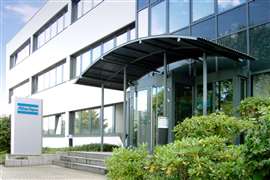Road sustainability - environmentally friendly machines and processes for road building
15 February 2010

Legislation is driving the road building sector towards more environmentally friendly machines and processes. Steve Skinner reports on a path towards sustainability that's seeing a reduction in energy consumption, emissions and the use of virgin materials.
When it comes into effect in 2011, Stage IIIB exhaust emissions legislation in Europe will lead to a new generation of road building equipment.
Europe and Africa regional manager for Caterpillar Global Paving, Joshua Meyer told CE, "Looking at the volume of new product introductions and designs at any given time, it's accelerated significantly as a result of Stage IIIB emissions legislation. Essentially, today our product lifecycle is driven by emissions legislation, which has affected to a degree what we'd like to add as features and what we have the time and resource to actually achieve.
"We've been fortunate that our engineering teams have been on top of the situation and we've benefitted significantly from the fact that Caterpillar is an engine manufacturer as well as an equipment producer. As a result, I am optimistic that we've had to make fewer sacrifices than some other manufacturers," he said.
Ahead of the emissions deadline, president of Bomag, Jörg Unger told CE, "There is no question that environmental issues must be addressed, but it does mean we've had to reduce our research and development budget for things beyond engines.
"The key to producing emission compliant equipment is managing the increased costs for our customers. We all expect a significant cost increase for compliant engines and over and above this we have to make fundamental changes to our equipment to fit the new engines, which again will have cost implications," he said.
Despite feeling that technology to make better equipment has been sidelined by the engine issue, Mr Unger told CE, "Bomag will show more at next April's Bauma exhibition than we did three years ago and I can confirm there will still be non-engine innovations on our equipment."
Ammann, like Bomag, believes that emissions compliance is an issue that is challenging every engineering department. "The new standards will call for more sophisticated powertrain components and additional functions to mitigate emissions," said Andreas Biedermann, head of corporate research and development.
"Stricter regulations are always a prompt for innovative solutions and we are taking this opportunity to have a serious look at new approaches for our compaction equipment. To this end, we believe we have found solutions that meet legislation yet don't impact on driver visibility or machine manoeuvrability," he told CE.
Asphalt
Mr Biedermann also believes that beyond engine emissions, environmental issues are a driving force in road construction generally.
"Today's challenge in the road construction sector is to build green roads with a minimum ecological footprint. Modern technologies to reduce CO2 and lessen the demand for virgin resources must be applied to asphalt production and compaction to help create a sustainable environment," he said.
"We conceived the Ammann parallel drum for asphalt recycling some 20 years ago and we've continued developing in this direction to the extent that our newest parallel drums can use 100% reclaimed asphalt," he told CE.
Mr Meyer shares the sentiment, "Environmental concerns are driving road building. This manifests itself in a whole variety of different ways from how roads are designed, through the increased usage of recycled material and warm mix asphalt, to the use of more environmental equipment producing lower emissions.
"Certainly, I think this trend is going to continue and accelerate," he told CE.
Terex Roadbuilding has introduced its latest foamed asphalt system for warm mix asphalt (WMA) based on an expansion chamber that means producers don't need any additives. The chamber mixes water and hot liquid asphalt and reduces mixing temperatures by up to -320 C.
Product manager at Terex, Joseph Musil said, "This system is capable of producing up to 544 tonnes per hour of asphalt at a 4% water injection rate. Furthermore, through mixing at lower temperatures there's a reduction in odour, particulates, CO2 and NOx emissions at the plant, while 'blue smoke' is virtually eliminated at the truck and paver end of the operation."
Martin Diekmann of the construction materials and process engineering division at Wirtgen believes cold recycling will play a significant role in the future of road building. "Cold recycling offers a -30% saving in project costs over conventional road building methods, when you take into account machine costs and personnel. Depending on the project and its whereabouts, it also offers a reduction of between -20% and -50% in materials costs."
Wirtgen offers six cold recyclers from the WR 2000 with a working width of 2 m to the range topping WR4200 featuring two milling drums, a twin-shaft compulsory mixer, a spreading auger and a paving screed for recycling roads between 2.8 m and 4.2 m wide.
"The environmental benefits gained from re-using 100% of the milled asphalt are massive," said Mr Diekmann. "You don't have to transport material, you don't have to buy 'new' material, you don't need to use landfill for disposal and you only have to heat the bitumen to 1750 C, which requires a fraction of the energy that is required to heat aggregate for hot mix asphalt (HMA).
"Europe is just starting out on the road to cold recycling, but it's already very popular in Russia and we see this area developing substantially in the future," he said.
Next January Wirtgen celebrates the second year of a strategic cooperation that has seen it established as Bennighoven's official distributor throughout Russia, the CIS (Commonwealth of Independent States) and Serbia. "This partnership has worked well in offering customers overall quality across the complete road technology sector," said Benninghoven's Anne-Jan Klompstra.
Benninghoven manufactures around 100 asphalt plants each year, with its biggest units capable of producing 500 tonnes/hour.
"We can remotely access all of our customers' asphalt plants from the factory here in Mülheim to see what problems exist or determine when servicing is required," said Mr Klompstra. "This means we can stay very close to our customers, which we feel we need to do because it's our name written on the side of their asphalt plants."
In September, Benninghoven opened a new subsidiary office and spare parts centre in Graz, Austria. "The location is central to our Austrian customers as well as to neighbouring markets in Hungary, Slovenia, Croatia and Serbia," Mr Klompstra told CE. "This will enable us to offer improved spare parts availability in the region."
Paving
In advance of Bauma, Mr Meyer confirmed to CE that Caterpillar will debut a new paver, a new mill cutter head and a new drum steer split drum compactor at the German show.
"The new asphalt paver that we'll show has been designed with the space claim already built in for Stage IV compliance," he said.
"We traditionally have an extremely strong presence in the North American and Latin American paving markets so we're now investing heavily in growing our presence in the European and Asian markets too. We have a host of new products, we have invested in training capabilities, our dealers have invested in their capabilities and through a combined effort we are aiming to make a real dent on the European market," he told CE.
Vögele recently launched its Super 700 mini paver to replace its four year old Super 600. The Super 700, which has been designed for minor to medium size paving duties such as pavements and minor roads and backfilling trenches features a track guage of just 1,1 m and a clearance width of 1,2 m.
Equipped with the vibrating (V) version of Vögele's electrically heated AB 200 extending screed with vibrators in the basic screed and in the extending units, the screed has a basic width of 1,1 m. This can be extended hydraulically up to 2 m and then through the addition of bolt-on extensions the pave width can be increased up to 3,2 m.
As well as extending the pave width, the AB200 screed width can be reduced down below the basic width of 1,1 m to as little as 0,5 m.
Trimble launched its PCS900 paving control system last month, an automatic 3D screed control designed to improve productivity and surface smoothness by directly referencing the road design.
A Trimble spokesperson said, "The PCS900 will help contractors achieve excellent results, minimise asphalt usage and help keep projects on time and in budget."
The PCS900 is a 3D extension of the two dimensional PCS400 and contractors will be able to switch between the two. "The combination provides contractors with a choice of sonic sensors, slope sensors, a sonic averaging beam and 3D slope and 3D elevation control on each side of the screed, which will help in producing smoothed seams and fewer waves," said the spokesperson.
Greener future
While legislation forces equipment manufacturers to reduce emissions, it's the underlying trend in road building design, material use and technique that could yet have the greatest and most positive impact on the environment.
As Caterpillar's Mr Meyer told CE, "We have to find more ways of minimizing the environmental impact of road construction and I'd say the trend in this direction is accelerating."






